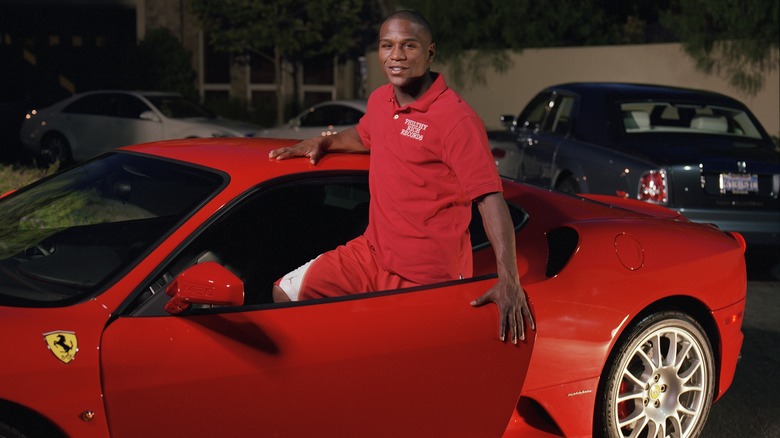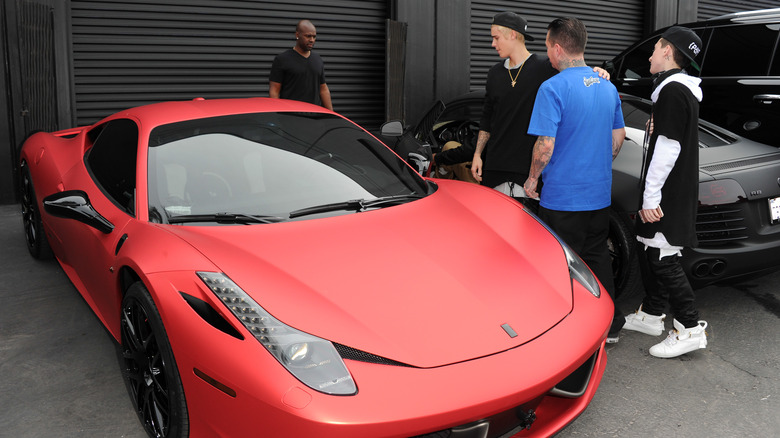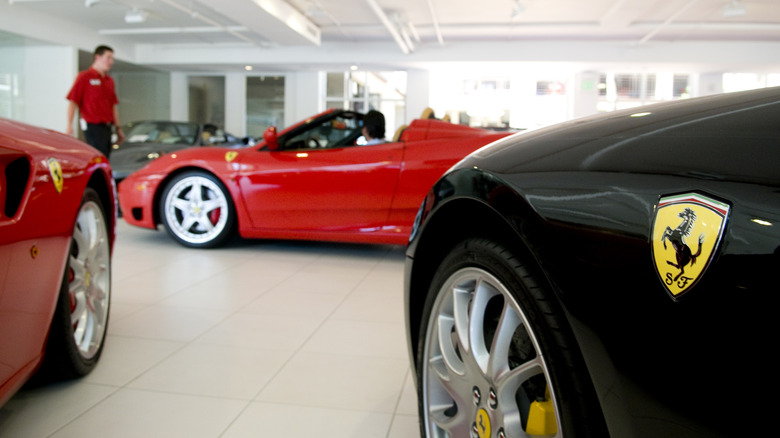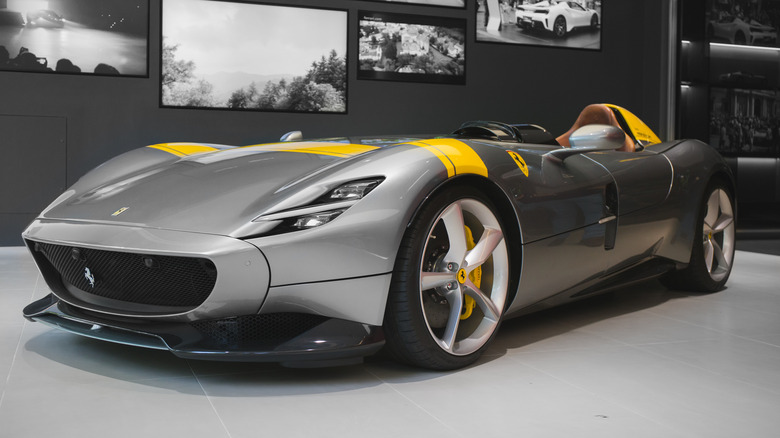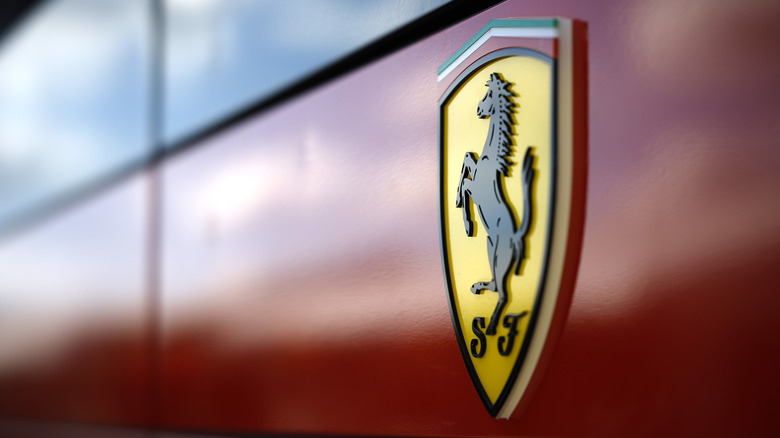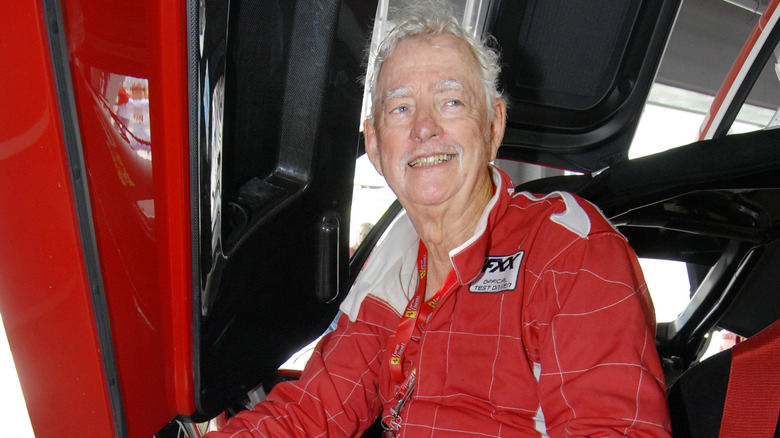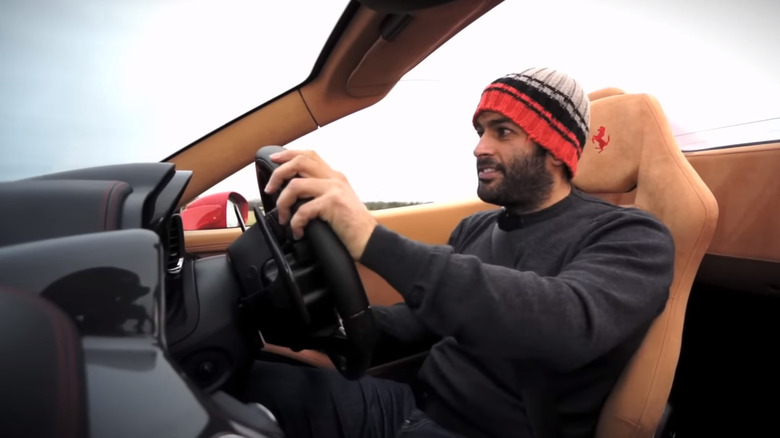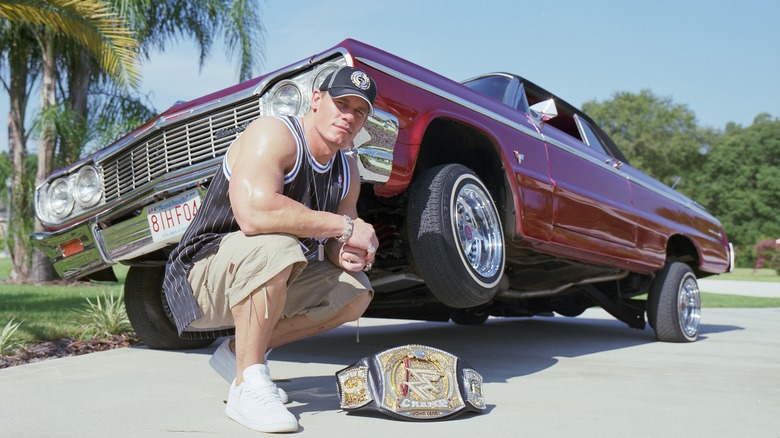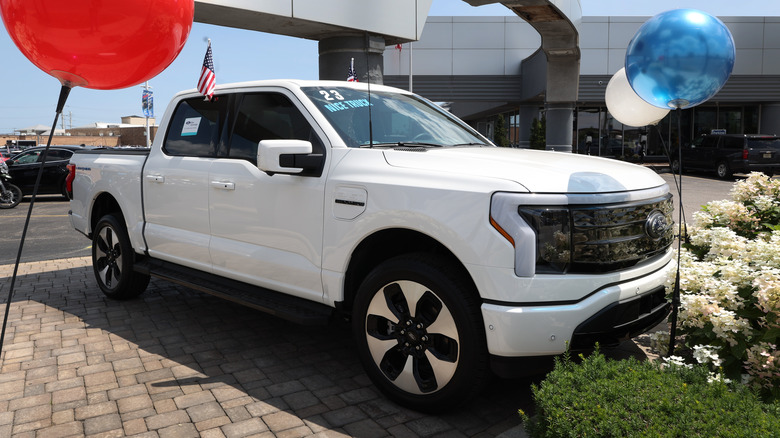The Celebrity Car Ban Rumors Explained
Having a celebrity pictured with your car can be a great source of free publicity for an automaker. However, not all publicity is of the good sort –- headlines about famous faces crashing cars, tackily modifying them, or flipping them for profit are not exactly great advertisements for the brand. There are lots of rumors out there about how car companies go about dealing with troublesome owners, with the idea of a so-called blacklist being one of the most persistent.
Ferrari is most infamous for its alleged blacklisted celebs, but other carmakers, from Bugatti to Ford, are also said to have banned certain individuals from stepping foot in their showrooms again. It's tricky to verify if there's any truth to these rumors, especially since no automakers have ever gone on record to explicitly confirm or deny the existence of such lists. That said, plenty of brands have tried new tactics in recent years to exert more control over who gets to own their most exclusive cars, even if they've stopped short of issuing outright bans.
Allegedly banned celebrities
There are plenty of high-profile celebs who have been reportedly shunned by carmakers over the years, with Ferrari's alleged bans being the most well-documented. Justin Bieber was said to be banned from owning Prancing Horses because of the questionable modifications he made to his 458 Italia, while Floyd Mayweather supposedly earned a spot on the list thanks to his penchant for buying cars and then selling them on only a few months after. Kim Kardashian, Tyga, and Nicolas Cage have also all been reported to be on the list, along with many others.
It's not just Ferrari, either. Bugatti reportedly banned Tom Cruise from buying another of its cars after he appeared to be unable to get his Veyron's door open on a red carpet premiere. Likewise, Formula One driver Jenson Button and television personality Simon Cowell have reportedly received bans from Bugatti after selling their cars too soon after buying them.
Most — but not all – of these celebrities haven't been seen driving cars from the brand they're supposedly banned from since those reports first came out. However, that in itself isn't proof of a blacklist, and it's quite likely that, if they wanted to, they could all get their hands on another Ferrari or Bugatti.
Why a full ban is impossible
The reality is that banning someone from owning any car from a certain brand is practically impossible. Even if an automaker was to send all of its authorized dealers an official blacklist, a banned celeb could still purchase cars under the names of associates or assistants or simply lease them from a third-party dealer. Then there's the used market to consider– there are plenty of relatively new supercars in the hands of non-franchised dealerships, and there's no feasible way for an automaker to enforce selling restrictions on all of them.
Even if the brand somehow managed to get over all of those hurdles, it's still possible that a supposedly banned celeb could borrow a friend's car, be pictured driving it, and still generate unwanted headlines. For all these reasons, it's not possible for even an automaker as PR-sensitive as Ferrari to enforce a blanket ban on any one individual. However, that's not to say that Maranello's finest can't control who gets to own its most exclusive cars.
Restricting who buys exclusive models is easier
That said, many of the world's most prestigious automakers, like Ferrari, Porsche, and McLaren, have lists of VIP clients who get first access to new, limited-run cars. Demand for these cars will almost certainly outstrip supply, which gives the manufacturer the room to be picky on who it chooses to sell to. This is where celebrities who offend carmakers might come unstuck –- they might have the funds and the desire to buy an exclusive car, but if they've been struck off the VIP list, they'll have no chance of buying one.
It's well known among Ferrari owners that the brand is the choosiest of all when it comes to VIPs, and a spokesperson effectively confirmed to Spanish outlet Marca that certain celebrities would be excluded from preferential status. Ferrari claimed in a statement that while it doesn't blacklist any customer, it "reserves the right to decide on [who buys] special editions."
Ultra-exclusive cars also often come with extra clauses in the contract that can prohibit resale within a certain time period or even require the owner to sell the car back to the automaker if they want to make room for something else in their garage. Failure to adhere to these clauses can result in being kicked off the VIP list or — in rare cases — even legal action being taken.
Ferrari's infamous celebrity legal action
Perhaps unsurprisingly given its reputation, Ferrari is known to be the most litigious of all high-end carmakers, although it's far from the only company to enforce its rules through the legal system. One of the most infamous Ferrari legal threats was against the EDM producer Deadmau5, whose custom-wrapped "Purrari" with a bright Nyan Cat design earned him a cease and desist letter from the brand. He complied and sold the 458 Spider shortly after without its distinctive wrap, but other accused celebs haven't backed down so easily.
After objecting to the use of its cars in a 2018 runway show, Ferrari launched a lawsuit against fashion designer Philipp Plein, which it eventually won. In the suit, the automaker also claimed that Plein's display of his personal Ferrari collection alongside his clothing line on Instagram was "unlawfully appropriating the goodwill" associated with its cars. However, it seems the animosity between the two parties didn't affect Plein's ability to get behind the wheel of desirable new Ferraris, as he was seen in an SF90 Stradale less than a year after the original verdict was delivered.
VIP status requires time and money
Even if Philipp Plein can still buy Ferraris, he's very unlikely to ever achieve VIP status with the automaker. In fact, the main reason many celebrities will never have to worry about being kicked off any automaker's preferential status lists is that they were never on them in the first place.
According to Ed Bolian of VinWiki, earning VIP status with any major supercar manufacturer will require attending every event you're invited to, adding as many pricey options as possible when buying new cars, and buying as many new cars as possible. The average celeb with a handful of supercars in their collection simply won't generate enough revenue for the manufacturer to get access to the most exclusive cars anyway, even if they do follow the rules in other regards.
Even those collectors who appear to be doing everything right don't always make the cut. Preston Henn, an avid Ferrari fan and former winner of the 24 Hours of Daytona, sued the Italian automaker when he was denied a build slot for the LaFerrari Aperta, arguing that the rejection had damaged his reputation as a collector. He eventually withdrew the lawsuit but passed away a year later without ever getting the chance to own the limited-run hypercar.
Celebs may not be banned, but journalists can be
While celebrities are generally safe from being banned by a certain manufacturer even if they generate bad press, the same cannot be said for journalists. By now, it should be no surprise to find out that Ferrari is one of the pickiest manufacturers about who gets to review its cars, as Chris Harris found out when he published a scathing article in Jalopnik in 2011. He took issue with the fact that Ferrari would allegedly tune its press cars to deliver more power and superior handling than customer cars, sometimes even demanding to know the track a magazine would take the car to for testing to ensure it was optimally set up.
This ensured that journalists would only ever write glowing reviews about Ferraris, while every other rival car was left at a disadvantage in comparison. Ferrari eventually responded and denied the allegations but banned Harris from receiving press cars in retaliation.
Ironically, he forced the brand to reconcile by proving he could acquire press cars even without Ferrari's approval, stating in a 2013 review for The Drive that "This [458 Italia] belongs to Ferrari and I'm probably not supposed to be driving it, but I'm not going to dwell on that. Someone kind of subcontracted it to me, let's say." It was later reported that the someone in question was Jeremy Clarkson, although this was never confirmed. Harris has since tested several more Ferraris, so it seems his defiant stance saw him removed from the blacklist.
Carmakers also take issue with reselling for profit
Alongside bad reviews from journalists, another issue that tends to leave a sour taste in the mouths of car company executives is when limited edition cars are purchased with the sole aim of flipping them for profit. VIP clients who missed out on a build slot for an exclusive car are not going to be happy seeing them in the hands of resellers and will likely voice their concerns to the automaker or lose interest in buying its high-end cars altogether. To prevent this from happening, companies can either add time-specific resale clauses to buying contracts or — in the case of the Porsche 911 S/T – lease cars to buyers for the first year to prevent them from selling.
Porsche bosses have stated that anyone caught flipping a car will be left off the list for the next limited-run model, but sometimes automakers go even further to ensure that no one unfairly profits from their cars. This can include taking legal action against owners who violate sales clauses like Ford did when John Cena sold his Ford GT after just a month of ownership.
Although he'd signed a contract prohibiting resale for the first two years, Cena reportedly struggled to fit in the car and drive it comfortably, prompting him to offer it for sale for roughly triple its original retail price. Ford sued and eventually came to a settlement, with Cena agreeing to donate an unspecified amount to charity.
Dealership markups are a more pressing concern for most carmakers
It's not just individual sellers that cause for carmakers — dealership price gouging is also a serious issue for sought-after models and one that affects a lot more buyers, too. Dodge's limited models like the SRT Demon saw huge demand at release, and to combat dealerships adding huge markups to each car, the Dodge promised to prioritize production for SRT Demons sold at MSRP or below.
More recently, the Ford F-150 Lightning was also subject to eye-watering markups, with one sporting a $69,000 premium over its MSRP. Dealers were also caught selling demonstration models which were supposed to be retained for test drives only, with Ford intervening and speaking to dealers individually once the problems were publicized in the media.
There's a good reason why brands are so keen to discourage greedy dealers –- research conducted by GfK Automobility showed that paying over MSRP seriously impacted a buyer's perception of a brand and nearly tripled the likelihood that they'd never buy from the same brand again. That could make a much more significant impact on a brand's bottom line than any bad publicity from an unruly famous face ever could, and so most brands take these issues much more seriously than any supposed celebrity bans.
